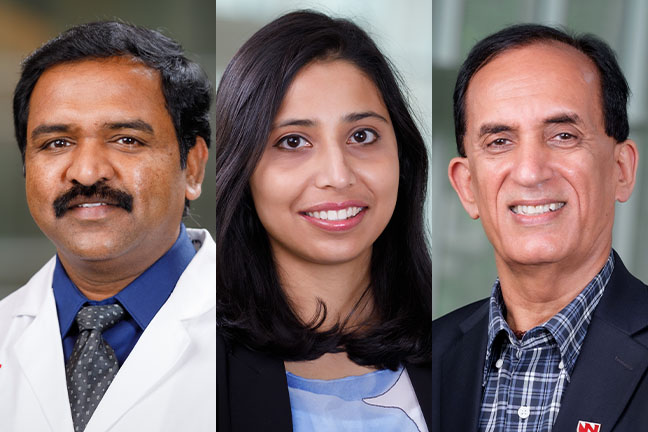A scientist team from UNMC has identified a molecular mechanism explaining resistance to chemotherapy effectiveness in each of the three deadliest versions of pancreatic, ovarian and lung cancers.
Their study, Elevated PAF1-RAD52 axis confers chemoresistance to human cancers, published recently in the journal Cell Reports, has been recognized by the scientific community. It has already been nominated for an honor in the International Research Awards on Oncology and Cancer Research.
But most importantly, this discovery could lead to translational research toward someday suppressing the PAF1 and RAD52 axis in drug resistance of pancreatic, ovarian and lung cancers, potentially increasing chemotherapy effectiveness. That would be huge news for future cancer patients and their loved ones.
“All three cancers are lethal cancers, and a major challenge is drug resistance while treating chemotherapy,” said principal investigator Moorthy Ponnusamy, PhD, associate professor of biochemistry and molecular biology.
To investigate the culprit behind chemoresistance within one cancer would have been big news. But as the research project expanded, Dr. Ponnusamy’s group found, “There is a common binding partner (creating the molecular mechanism) occurring on all three cancers, which is surprising.”
It also is exciting, as it points to the potential to improve the lives of those stricken with these three cancers.
Dr. Ponnusamy said Sanchita Rauth, PhD, as a graduate student and now a postdoc in his lab, deserves extensive credit for this project.
“Dr. Rauth is a dedicated young scientist who worked hard to get this comprehensive publication. She developed different models to prove this concept,” Dr. Ponnusamy said.
The scientists took pancreatic, ovarian and lung cancer models and used state-of-art technologies to find the molecular mechanism in each of the three cancers that lead to chemoresistance.
The genesis of the project stretches back to the 1990s, when Surinder Batra, PhD, Hartmann Professor, discovered the pancreatic differentiation 2 (PD2), now also called PAF1 molecule in pancreatic cancer. Dr. Ponnusamy joined Dr. Batra’s lab as a postdoc in 2006 and continued to study the role of PAF1 in pancreatic cancer progression.
“We started working extensively with PAF1 molecule, and we discovered its impact on embryonic stem cells, cancer stem cells and cancer progression,” Dr. Ponnusamy said.
He is proud to have continued this work with Dr. Batra, his mentor.
Drs. Ponnusamy and Batra have been working not just in pancreatic cancer but also in ovarian and lung cancers by collaborating with clinical oncologists at UNMC. Thus, the team had expertise in all three cancers.
Apar Ganti, MD, professor of oncology and hematology, and Jason Foster, MD, professor of surgical oncology, also have added crucial contributions to the study, including models for lung and ovarian cancers.
Translational research is the next step, Dr. Ponnusamy said. The investigators are working on a combination of inhibitors to suppress these molecules and improve the therapeutic efficacy for these lethal cancers.
That’s down the line. Dr. Ponnusamy’s team currently is working on organoid models for each of the three cancers, which will be used for personalized therapy.
Dr. Ponnusamy’s group developed a spontaneously silenced animal model for PAF1 to understand its function in cancer progression.
Researchers hope human clinical trials will be possible over the next few years. Dr. Ponnusamy is working closely with colleagues at the Fred & Pamela Buffett Cancer Center, several of whom are collaborators and co-authors of this study.

Congrats!!
Many Congratulations!!
Congratulations to the entire team!
Congratulations!
Nice piece of work, Congratulations!
Hearty congratulations Dr. Murthy Ponnusamy and your team. Wish to achieve many such outstanding translational research outcomes in the future.
Congratulations!
Excellent work. Congratulations.
Congratulatons Everyone!! Proud of you all!!
This is truly amazing! Thank you for your contributions to science and your dedication to improving the lives of cancer patients.
Congratulations to the team!
I know that this has been a long-term commitment of the lab so congrats to Sanchita, Moorthy and Surinder!
Great achievement. Congrats for the hard work!!
Congratulations-Awesome work.
Wow, just wow!
Congratulations to all of you!
Congratulations.
Great team work. Congratulations to all.
Congratulations!!
congradulations
This is a huge breakthrough! Congratulations to all of you !
Janice and Jimmy
Advanced Microscope Core Facility
Congratulations! Well deserved!!
Congratulations!
Outstanding work – congratulations!